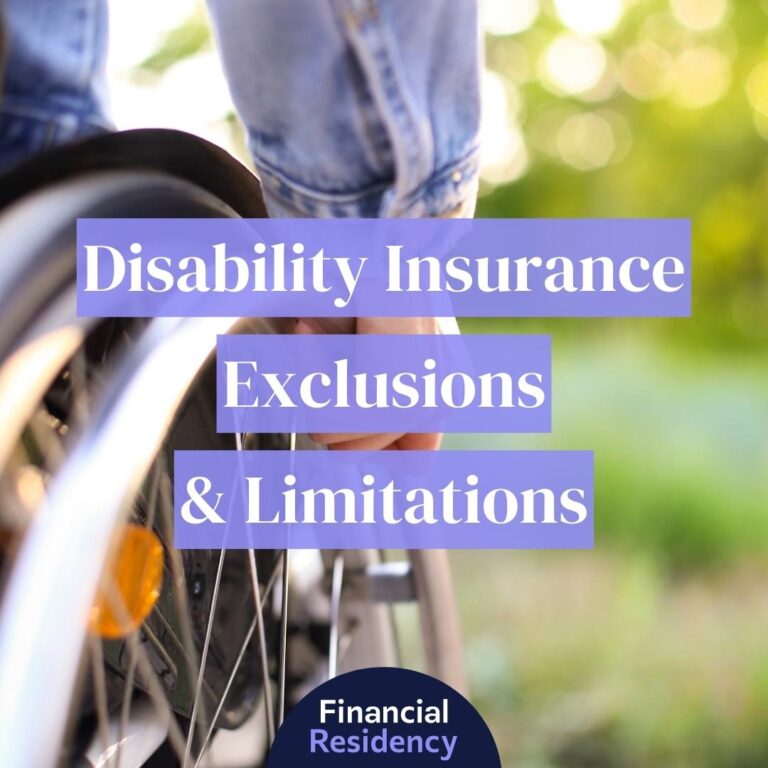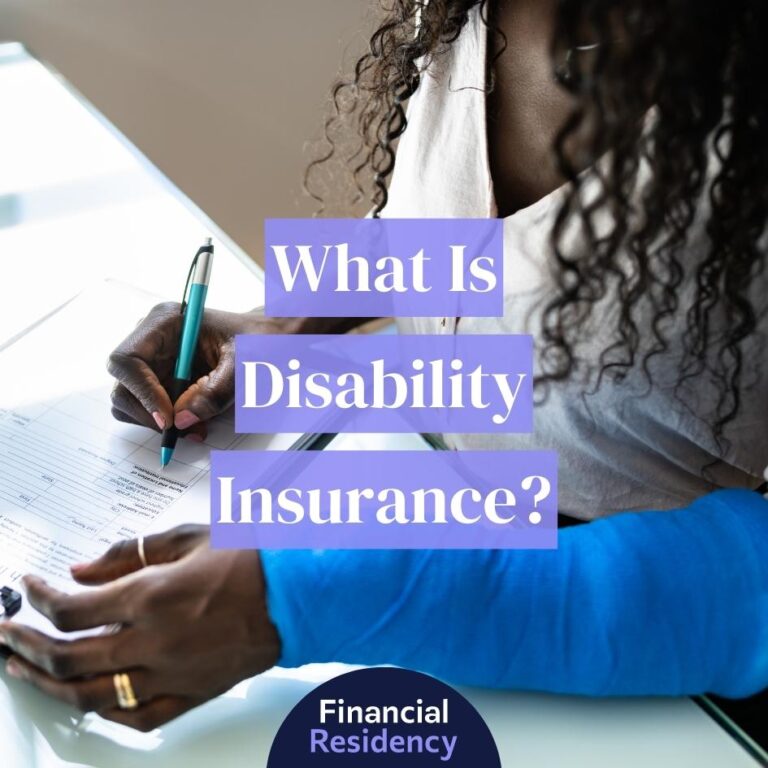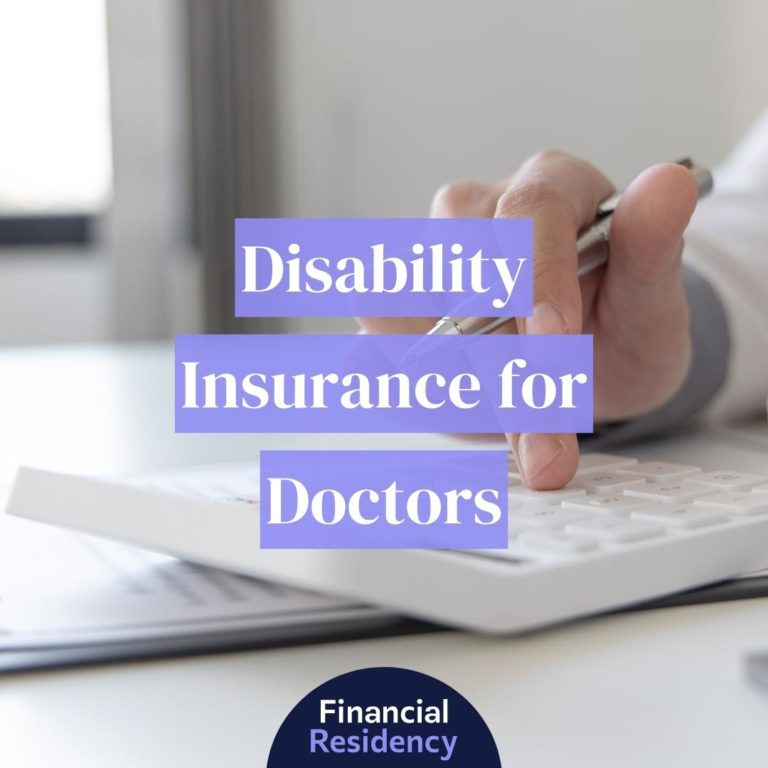As a physician, protecting your income is necessary, especially in the event of a disability that could prevent you from practicing medicine. While some physicians may access disability insurance as part of their employee benefits, individual policies can be more advantageous.
Disability insurance provides financial security by replacing a portion of your income if you become disabled and unable to work, which allows you to keep up with your living expenses while you recover. However, choosing the right disability insurance policy can be overwhelming.
Top 10 Disability Insurance Questions
To help you make an informed decision, here are ten important questions you should ask before buying disability insurance coverage.
1. What is the definition of disability in the policy?
Understanding how different policies define disability is essential. Some policies may have a stricter definition of disability, making it more difficult to file a claim.
Look for a policy that defines disability as the inability to perform the job duties of your specific medical specialty rather than a broader definition that may require you to be unable to work in any occupation. Own-occupation policies are more inclusive and comprehensive.
2. What is the elimination period?
The elimination period is the waiting period before your disability benefits kick in. Knowing how long you will need to wait before receiving benefits is important.
Typically, disability insurance elimination periods range from 30 to 365 days. Because the range varies tremendously, knowing the period of time before your disability coverage pays out is essential. Consider your financial situation and choose a policy with an elimination period that aligns with your needs.
Short-term disability insurance policies will have more brief elimination periods than long-term disability insurance.
3. How long will benefits be paid?
Knowing the duration of benefit payments is crucial. Policies vary in terms of how long they will pay benefits. Some policies provide coverage until retirement age, while others have a limited payment period. Ensure you understand your benefit period so you can plan for maximum benefits.
Consider your long-term financial goals and choose a policy that provides coverage for as long as needed. We recommend carrying long and short-term disability insurance to preempt potential benefit period gaps.
4. What is the benefit amount?
Understanding the monthly benefit amount is essential when considering disability insurance. The benefit amount is the percentage of your pre-disability income that the policy will pay.
Typically, policies provide monthly benefits ranging from 50% to 70% of your income. The benefit amount can vary depending on the individual’s pre-disability income and specific insurance policy terms.
Consider your monthly expenses and choose a benefit amount that will adequately cover your financial needs.
5. Are there any exclusions or limitations?
You’ll need to know exactly what your disability insurance covers to know how it fits into your larger financial picture.
It is important to review the policy for any exclusions or limitations carefully.
Some policies may exclude coverage for certain pre-existing conditions or limit coverage for certain types of disabilities. Some policies may require a total disability, while others payout for partial disabilities.
Knowing what is not covered and any restrictions can prevent surprises and ensure you have appropriate coverage.
Take the time to thoroughly review your policy and familiarize yourself with any exceptions or conditions. Familiarizing yourself with your policy details will give you a clearer understanding of what your disability insurance will and will not cover.
6. Is the policy non-cancelable and guaranteed renewable?
Look for a policy that is non-cancelable and guaranteed renewable. Non-cancelable means that the insurance company cannot cancel your policy or increase your premiums as long as you continue to pay the premiums on time.
Guaranteed renewable policies ensure the insurance company cannot change the policy terms or conditions as long as you continue to pay the premiums. These features provide you with peace of mind and long-term stability.
7. Are there any additional riders or options available?
Some disability insurance policies offer additional riders or options to enhance your coverage. The cost-of-living adjustment (COLA) rider, residual disability benefits, and future increase options that increase coverage as your income climbs are common riders.
Evaluate the available riders and options to customize your policy to suit your needs.
8. How are premiums determined?
Understanding how disability insurance premiums are determined can help you choose a plan that fits your budget. Insurance companies use various factors to calculate premiums, such as age, medical specialty, overall health, and the desired benefit amount.
Younger individuals generally pay lower premiums, while older individuals may face higher rates due to an increased likelihood of disability. Additionally, those working in high-risk occupations may have higher premium rates.
Furthermore, the benefit amount you choose directly affects the premium, as higher coverage will result in higher premiums. By comprehending these factors, you can make informed decisions when selecting disability insurance and ensure you get the coverage you need at a price you can afford.
9. Is the insurance provider reputable and financially stable?
A reputable and financially stable provider will give you confidence in the company’s ability to pay claims and provide reliable coverage.
Research customer reviews and ratings from trusted sources, including the Better Business Bureau and TrustPilot, to determine their reputation. Look for feedback on their claims handling process, customer service, and overall satisfaction.
Additionally, consider the provider’s financial stability by examining their credit ratings from reputable agencies and reviewing their financial statements. Look for indicators such as strong profitability and solvency ratios. A.M. Best is a great resource for vetting financial strength.
A financially stable provider will be better equipped to honor their commitments and pay claims promptly. Conducting thorough research and analysis will help you choose a reputable and financially stable disability insurance provider.
10. Can the policy be reviewed by an attorney or financial advisor?
Consider seeking professional guidance from an attorney or financial advisor to review your disability policy. These experts have the knowledge and expertise to thoroughly examine your policy and ensure its terms and conditions align with your needs and expectations.
Their insights can help you understand the intricacies of your policy, identify any potential gaps or limitations in coverage, and provide recommendations on how to enhance your protection.
By consulting with professionals, you can make informed decisions and have more confidence in the effectiveness of your disability policy.
Why Doctors Need to Consider Disability Insurance
Disability insurance is a critical investment for doctors to safeguard their income, protect their assets, and ensure financial security in the face of disability. Here’s a quick summary of why physicians need disability coverage.
- Income protection: Doctors rely on their income to support themselves and their families. Disability insurance provides a safety net if they cannot work due to an illness or injury.
- High-risk profession: Being a doctor involves long hours, physical demands, and exposure to various health risks. These job hazards increase the likelihood of disability.
- Protect assets: Doctors invest significant time and money in their education and in establishing their medical practice. Disability insurance helps protect these assets by providing financial support when they are unable to work.
- Medical expenses: In the event of a disability, doctors may incur additional medical expenses for treatment and rehabilitation. Disability insurance can help cover these costs and prevent financial strain for expenses not covered by health insurance.
- Peace of mind: Disability insurance provides peace of mind, knowing that if an illness or injury prevents a doctor from practicing medicine, they will still have a source of income to support themselves and their families.
- Early career protection: Disability insurance is crucial for doctors starting their careers, as they may have significant student loan debt and limited savings. This coverage ensures they can continue to meet their financial obligations even during a disability.
Other Frequently Asked Questions
How do I know if I need disability insurance?
You need disability insurance if you or your family depends on your income to keep up with living expenses. Even if you carry sufficient life and health insurance, disability insurance provides financial protection if you ever have a period of time when you can’t work due to an unexpected illness, accident, or disability.
Do I need disability insurance even if I’m collecting from the Social Security Administration?
Yes, you may still need disability insurance even if you can collect Social Security Administration benefits. Taxpaying Americans have access to Social security disability insurance (SSDI), but it’s often a smaller monthly benefit than individual disability insurance.
Are disability benefits considered taxable income?
Disability benefits are tax-free if you paid for the premiums with after-tax income. However, employee benefits may be subject to tax liabilities. You can consult a financial advisor or tax attorney to understand your liability better.
Can I work part-time while collecting disability benefits?
The exact parameters around your ability to work while collecting disability benefits will depend on your insurance plan and provider. For example, SSDI recipients are more limited in working hours and income than those with private disability insurance.
Final Thoughts
Purchasing disability insurance is crucial in protecting your income as a physician. By asking these ten questions before buying disability insurance, you can make an informed decision and choose a policy that provides the financial security you need in the event of a disability.
Remember to carefully review the policy, seek professional advice if needed, and choose a reputable insurance provider to ensure you have reliable coverage that meets your specific needs.
An insurance broker or fiduciary financial advisor can help you review insurance plans, determine your coverage needs, and shop for a policy that supports your financial goals.



